Hugo is an overstuffed candy-box film of the type that some people really, really like. And if you add “A Martin Scorsese Confection” to the tag, everybody’s over the moon with how unexpected it is, this gift to mankind that’s so creamy and delicious and deep.
I didn’t like it much, myself, but then people say I’m not very nice when it comes to films. And this is one of those super-nice films. Nice nice nice. Even the meanest characters turn out to be nice, or else they conveniently go away early on and die in the snow. It’s very nice snow!
Do children like this nowadays, the no-tension, no-real-villainy thing? Or do their parents like it for them? I can’t really tell. I only know a few kids these days, and they are proper old-school boys when it comes to art and entertainment. One of them lives for the day his parents will let him watch zombie movies, and the older one, who has such a vast collection of skull T-shirts he can wear a different one every day, has frequently declared, “I love evil.” Both are unusually polite, sweet-tempered boys, too; their pursuit of evil in entertainment only seems to make them kindlier in real life. Would they like Hugo?
Well, I doubt it. But I’m such an old hand at the pursuit of filmed evil, it could be I’m jaded, and not a fit judge anymore.
Anyway, here’s the rundown: Hugo is based on the children’s book The Invention of Hugo Cabret by Brian Selznick. It’s about the kid Hugo (Asa Butterfield) whose clockmaker father dies and leaves him to the doubtful care of his drunken uncle (Ray Winstone). The uncle installs him in the giant clockworks of the Montparnasse train station in Paris before conveniently exiting stage left to die.
(Dickens would’ve kept the drunken uncle alive and a fixture in the story, for sure. He would’ve made the kid’s life a hell till he had to run off and meet other memorably rotten folks. But we’ve jettisoned the wisdom, realism, and entertainment value of the Dickensian model, which tells us we’re liable to have to run a long, long way in life before we meet some nice people.)
Hugo goes on winding the clocks, plus stealing from the merchants in the train station in order to survive. It would seem to be a kind of kid-heaven—total independence, plenty of amusements, and a big clock to live in, but this kid is wan and sad throughout. He’s even sad about not going to school anymore. He’s lonely, see, and perpetually mourning his dead dad (Jude Law, who’s quite good when he’s not in the lead role) by trying to complete the museum-piece automaton his dad found, as a kind of posthumous communion. The automaton is very nice—a placidly asexual silver fellow with solid-black eyes.
The kid is periodically harassed by the Station Inspector, a pompous martinet in a blue-velvet suit and a metal leg brace, who’s always on patrol with his Doberman Pinscher Max, hunting for thieving orphans. (Excellent dog acting throughout.) The Station Inspector is played by Sasha Baron Cohen, who manages to nail down a brisk comic tone that livens up every scene he’s in and gestures toward a better movie, one that could’ve been less slow and precious and glutinous. The Inspector has a crush on the flower-seller Lisette (Emily Mortimer), so you know early on what’s going to turn him into another monotonously nice character.
So the plot lumbers along like this awhile till the kid and his new friend Isabelle (Chloe Grace Moretz) try to solve the mystery of what’s ailing her angry guardian “Papa Georges” (Ben Kingsley). Turns out he’s embittered because he’s Georges Melies, the forgotten film pioneer, so the kids have to get him rediscovered and lionized. Which they do.
Is that a spoiler? Can a plot like this be “spoiled”? I don’t know. Not a fit judge. NAFJ.
The Georges Melies plot device puts all film critics and would-be cineasts into ecstasies, because it’s regarded as an essentially good thing whenever a film includes a film history lesson. I don’t know why. But I’ve read reviews about how marvelous it is that Martin Scorsese, auteur, has worked into this movie his own obsessions with film history, has even presented a kid-version of himself in Hugo, a character who saves a filmmaker and his films. See, Scorsese is always running around saving “lost” films and doing documentary tributes to filmmakers, and he once did this very admirable thing for the great director Michael Powell. Powell was living in poverty somewhere in England, all but forgotten, when Scorsese rescued him and got his film Peeping Tom shown and appreciated decades after it was condemned as so shocking it drove Powell into obscurity. Scorsese’s editor Thelma Schoonmaker then married Powell, and it was all very heartwarming.
There’s even a big plug in Hugo for film preservation, Scorsese’s favorite cause. And apparently Scorsese is a Melies fan, because he shows the most lovingly restored clips of old Melies movies ever, and actually makes a case for their being watchable anytime after 1910. Judicious editing really helps. If you’ve ever actually slogged through A Trip to the Moon (1902) or any of the less-famous Melies films, you know the punishing pace and static camerawork and elaborate staginess of the Melies experience, which changes very little over the course of his many films. For every clever effect that makes you say, “Oh, that was pretty good!”, there’s a ton of leaden footage of plump chorus girls waving their arms pointlessly, and cardboard sets sliding in and out, and endlessly repeated trick shots of monster-suited extras leaping into invisibility with a poof of stage-magician dust.
In other words, Melies ain’t my favorite of the cinema pioneers. And Hugo is fundamentally dishonest about how World War I and the traumas of modern reality overrode audience’s capacity for “magic,” thus ruining Melies’ career. It’s a miracle he held onto popularity as long as he did, considering how speedily films were developing, especially in the area of editing and camerawork. He had a darn good run, considering. But it seems he did wind up poor, running a toyshop in the Montparnasse train station, till he was rediscovered and feted. So this yarn is based on some broadly factual stuff.
But the poverty Melies is supposed to be enduring in the film takes the form of a very posh toyshop at the lushly beautiful station, and what looks like an eight-room luxury flat in a lovely part of town. You get to the flat by walking along a promenade lined with cowled statues, all apparently mourning Melies’ sad case. Oh, it’s a massive pity party, this film!
No expense was spared in making the film visually splendid. It’s art-designed and CGIed to the point of suffocation. There’ll be no end of Oscar nominations piled onto it. Much is being made of Scorsese’s foray into 3-D, and it looks very nice, with those swooping kind of shots meant to wow us with how you can start a mile in the sky over 1930s CGI-Paris and then glide down and swirl around seamlessly into the pupil of Hugo’s eye looking through a peephole. But see, we’ve already watched many swooping shots from macro to micro in our 3-D/CGI filmscape. And hard as Hugo tries to make it seem thematically relevant, the way small objects and actions and lives are tied to big world events, and the way movies seem to have a unique capacity for showing us “the big and the small” (as old film theorist Siegfried Kracauer put it)—it just, somehow, doesn’t come across, doesn’t add up to anything memorable.
But it’s very nice. And between Thanksgiving and Christmas, people crave that. Or so they tell me.
Read more: 3-D, CGI, film history, Georges Melies, Hugo, Jude Law, Martin Scorsese, Sasha Baron Coehn, Eileen Jones, movies


Got something to say to us? Then send us a letter.
Want us to stick around? Donate to The eXiled.
Twitter twerps can follow us at twitter.com/exiledonline




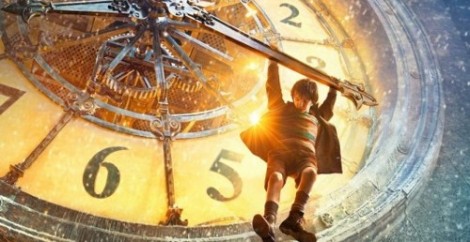
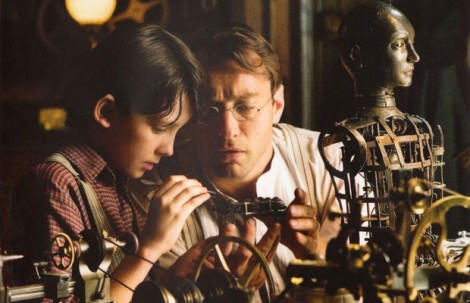
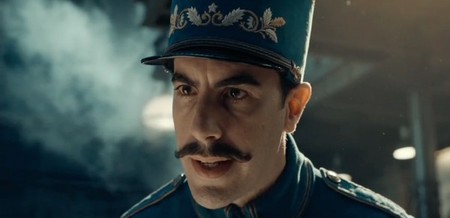
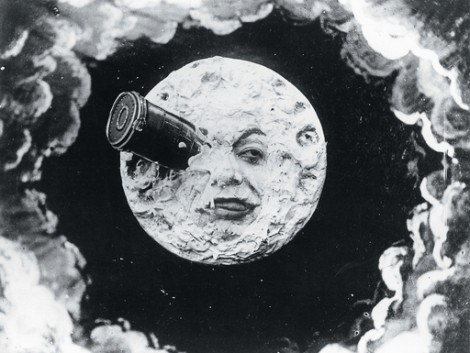
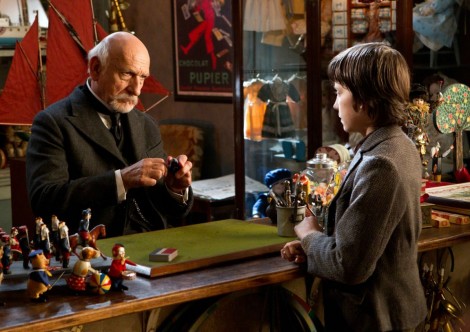

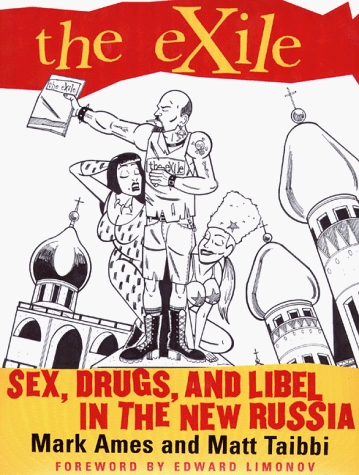









36 Comments
Add your own1. n/a | November 26th, 2011 at 4:50 pm
You’re an adult reviewing a children’s movie and constantly referring to it as “nice” as though children really crave anything but.
2. gc | November 26th, 2011 at 6:17 pm
@ n/a
You’re a twit reviewing a non-twit’s review.
3. required | November 26th, 2011 at 6:31 pm
The logical end result of child psychologists and social workers forbidding everything, and of the institutionalization of the Brezhnev-worthy Delphi technique in which disagreeing is a mental disorder.
4. adam | November 26th, 2011 at 6:59 pm
Uh.. maybe it was different for you, but being nice was the last thing on my list as a kid.
5. Lev | November 27th, 2011 at 4:22 am
‘…it’s regarded as an essentially good thing whenever a film includes a film history lesson.’
I LOVE you. I think such a film maker should be executed. And also novelists who write novels about novelists. Not to speak of financial speculators, who speculate about financial speculation. WANKERS!
6. vortexgods | November 27th, 2011 at 5:10 am
Lemony Snicket is a good antidote to what you are talking about. His Count Olaf gets real enjoyment out of plaguing the Baudelaire orphans and murdering innocent victims. He also has a good sense of humor, and likes to make jokes about his murderous plans for the orphans in their presence.
Of course, that was probably why there was only the one Series of Unfortunate Events movies, and why they butchered the ending of it so badly.
Still you could do a lot worse in kids books.
7. Zoner | November 27th, 2011 at 5:53 am
But how twee is it? Overly, self-consciously, nauseatingly, or unbearably?
8. Trevor | November 27th, 2011 at 6:13 am
I agree, kids sure as hell don’t crave nice. They must get that programming later though, because this sort of nice-icing on a nothing cake is the biggest seller in America.
Still, I can’t really hold this against Scorsese. He’ll always have my respect for Goodfellas – a much better movie than The Godfather.
9. kallipugos | November 27th, 2011 at 7:33 am
Oh hell, why not just go see ‘Melancholia’ and watch Kirsten Dunst pee on the lawn and hump the help like a dog and rub her tits in the eerie moonglow of approaching total planetary annihilation? Way more entertaining.
10. Duarte Guerreiro | November 27th, 2011 at 10:50 am
I remember being 7 and sneaking a tape of Predator into the house so I could watch all those dismemberments my school buddies were always talking about. Every weekend I would watch Jurassic Park, memorizing every soft humanoid disemboweling scene.
Still, I know plenty of people who swear on the stone that they just looooove Aladdin and the Little Mermaid and have the VHS tapes to prove it too. They obligingly rush to the theaters each time a new Pixar turd comes out in some kind perverse attempt to reconnect with their magical childhood memories.
Exholes are probably just wired different, hmmm?
11. gc | November 27th, 2011 at 2:18 pm
@ 10
Yeah, well if you don’t love The Little Mermaid, that’s your problem, childhood love of carnage or not. Never mind the rest of it, the songs are a feat of genius.
12. korman643 | November 27th, 2011 at 2:29 pm
Eileen’s comment on Melies is correct, as, despite what movie pedants say, the best/still watchable stuff he did was just a fraction of his overall production, and Melies work has not aged well – if you go beyond the usual shorts you see around (and that, I understand, are the same used by Scorsese.)
This said, and still keeping with the “they don’t do good children movies anymore” theme, there was someone who, in the late 50’s and early 60’s did produce stuff inspired by a Melies-like ingenuity (plus tons of Verne’s quotes) but did it fresh and still very watchable: Karel Zeman, a Czech director who was somehow quite famous at the time in Europe, but I believe it completely unknown in US.
Zeman did some stuff that was ingenious AND funny (even if of course slow by today standards, but who cares, really), and still interesting to watch now. The most famous (because it’s the only one who got an US release) is 1958 “The Deadly Invention” (aka “The Fabulous World of Jules Verne”, the US release name). It’s an adaptation of Verne’s “Facing the Flag”, which in turn is a rework of Verne’s earlier “The 500 millions of the Begum”. I loved every second of it when I was a kid, and it’s still a good movie (whose visuals have be endlessly stolen afterwards by everyone and his dog – for instance Gilliam)
http://www.youtube.com/watch?v=ll8Tj3FFDf4
(click on “CC” to see the subtitles)
My favourite Zeman is however 1961 “Baron Prasil” aka “Baron Munchausen”, a gazillion times better adaptation of the Munchausen legend than the Nazi bore (albeit cute) 1943 version or the Terry Gilliam slog.
http://www.youtube.com/watch?v=z9tjcHdJwB8
(again, press “CC” for the subtitles)
Another great children movie from Zeman is 1966 “The Stolen Airship”. This one is really juvenile in the utmost sense of the word, but is lovely
http://www.youtube.com/watch?v=1dobJ1PJcDk
(“CC” for the – bad – English subtitles)
I agree also on the complaint that current “kid” movies want to be nice, but are normally just lame. Not to play the nostalgia trick here, but I come from a generation who had the privilege to grow on incredibly mean stuff (remember, from 1965 to 1980 Disney was more or less out of the picture) so for us Western Euros it was either WB cartoons, pre Star War SF movies, or tons of great Japanese stuff, including some of the goriest cartoons ever (Do anyone here remember “The Legend of the Seven Tailed Fox”?). We had also a fair share of avantgarde or just very well done but not blatantly commercial stuff like Norman Maclaren shorts, or Jiri Trnka puppetry.
Back then one was spoiled by the mere amount of viewing choice…
13. Nestor | November 27th, 2011 at 2:51 pm
Eh, I dunno. Kids are pretty savage little shits, but they’re also pushovers.
I know I was a lot nastier when I was a kid, but I’d be scared silly by stuff that doesn’t make me blink nowadays.
If I’m softer nowadays it’s more intellectual, I guess. A lot of fiction for children is about how we want the little bastards to be, rather how they actually are. Dunno if I’m making sense here.
As for Melies’ editing, can’t blame him, people’s tolerance for long shots was probably at the maximum when he was doing his thing.
14. Martin Finnucane | November 27th, 2011 at 3:35 pm
@Duarte
No, eXholes, whatever they are, are not wired differently. The difference is that your suburban-bourgeois friends are liars. Lying is a deep and central part of being a real middle class, middle-of-the-road (read: white) american.
15. Duarte Guerreiro | November 27th, 2011 at 5:53 pm
@14
Except me and mine are neither suburban, bourgeois or American and we have no such thing as a middle class here (even if everyone pretends they are). The red, white and blue tumor has infected deep. I bet you could go to the farthest assholes of the world and they love the Little Mermaid there too, “feat of genius” songs and all.
Gods, above all else, I hated the songs.
16. Mitchell | November 27th, 2011 at 6:36 pm
What I’d like to see is a “film about film” where the moral is that George Lucas has the right to make Darth Vader say “NOOOO” before he kills the Emperor, because it’s his creation, and who cares about the outraged fans. (For a title, I suggest: “It’s a Wonderful Line”.)
Also, allow me to highlight a bit of real-life wisdom that Eileen slipped in: “we’re liable to have to run a long, long way in life before we meet some nice people”.
17. Paul Morel | November 27th, 2011 at 9:07 pm
“Lying is a deep and central part of being a real middle class, middle-of-the-road (read: white) american.”
As opposed to the honest, virtuous, oh-so-oppressed non-whites. Does anyone ever stop to think how paternalistic the whole whites=bad, everyone else=innocent victims narrative is? Isn’t paternalism bad, an affront to the autonomy of the other? Or is it okay if you’re liberal–because, after all, you just (purportedly) have their best interests in mind? But I guess considering this issue lucidly would require thinking outside the box–and I don’t just mean the pseudo-rebellious liberal box.
You may feel rebellious rejecting conservatism, but the fact that you immediately step into the liberal box, i.e., the Politically Correct Orthodoxy means it was just a pose all along. Feeling rebellious while having your behaviors sanctioned and even encouraged by society. Win-win.
18. gc | November 27th, 2011 at 10:04 pm
@ 15
“Gods, above all else, I hated the songs.”
Well yes, that’s because you’re stupid.
19. gc | November 27th, 2011 at 10:18 pm
@ 17
You know, your basic points (that using “white” to connote “bland” patronizes non-whites; that many people’s self-proclaimed liberalism is really just an attempt to get the thrill of rebellion without any of the inconvenience) are actually valid.
Unfortunately (for you), you’re failing to conceal that you don’t actually care about either of them.
If you want to convince people that you’re truly motivated by righteous indignation against paternalism and hypocrisy, then first you’re going to have to learn to suppress the grotesque self-pity that’s bleeding all over your comment.
20. CensusLouie | November 28th, 2011 at 12:18 am
It never fails to amaze me what subjects bring out the Sean Hannity crowd in the comments, and now I get to add “children’s movie review” to the list.
Anyways, who in the fucking world thinks that a kid’s idea of a good time is educating them on pre-WWI French directors? That reeks of an aging Sorsese reaching for immortality hoping that someone will do the same for him in the year 2131 (didn’t Tom Hank already make a show sucking off Melies?).
If you’re going to stick historical figures in a work of fiction, at least make them notable. “Semi-innovative for the time special effects director” isn’t the most thrilling subject. Honestly, the most interesting part about Melies was his horrific turn of luck that landed him in the gutters. If you take away the severity of that then what’s the fucking point?
Oh right, Sorsese’s massive projection effort to be remembered the next century. The man ceased to be relevant the instant he guest starred on Entourage (where has beens, wash ups, and never weres go to die).
21. lev | November 28th, 2011 at 4:50 am
When Hollywood gives us mulriracial gangs, characters, who always have a black best friedns and even ‘more complex studies about race relations’ (Crash) I feel like I might as well watch some youtube-spot by David Duke. It’s so insulting to EVERYBODY.
Not only are all ethnicies and cultures just as bad (the native Indians hunted the buffaloes to extinction, tortured their prisoners and used slaves) but every culture (and ethnicity often correlates with culture) have their own perticular nasty charasteristics. They ARE NOT GENETICAL, but thei damn well are there. But this is something so taboo, that if you even THINK about them the brain police will send you for a re-programming gulag. First the Indians were bloodthirsty savages. Then they became Avatar-like demi-gods.
The people ‘close to earth’ have no deeper inner wisdom, if anything they are nastier and greedier than the more civilized town dwellers. Chekhov, who was of peasent class himself, knew this. Dostoyecsky & Tolstoy, members of the elite, had a more romantic picture.
I also sometimes dream of having my own goats and vegetable garden and becoming a better person. But then I remember that the willing executers of Pol Pot were ‘simple farmers’.
22. Duarte Guerreiro | November 28th, 2011 at 12:24 pm
@18
Watch out people, the Lion King is here. Don’t hate me bro, Ames and Levine are the ones with Jew names, why don’t you go write them some hate mail, Simba? It would be what Disney would have wanted.
23. maus | November 28th, 2011 at 1:00 pm
“those swooping kind of shots meant to wow us with how you can start a mile in the sky over 1930s CGI-Paris and then glide down and swirl around seamlessly into the pupil of Hugo’s eye looking through a peephole.”
It’s a shame that people still think these sort of shots are necessary. They add so little.
24. Cernunnos | November 28th, 2011 at 1:19 pm
@21
“Anyways, who in the fucking world thinks that a kid’s idea of a good time is educating them on pre-WWI French directors?”
You’re acting like Scorsese wrote the story. It’s an adaptation of a novel. Why don’t you ask this question of Brian Selznick.
“If you’re going to stick historical figures in a work of fiction, at least make them notable.”
Here I was all this time thinking Melies was actually notable. Granted, I did study film, so I heard about Melies more times than I can remember, but even before that I was familiar with the iconic image of the moon-face with a rocket in his eye. Melies may not be a household name, but he’s not so obscure as to not be notable. He’s a pretty important figure in film history, whether or not the quality of his films stands up nowadays.
The other question I have is, how do you determine who is notable enough? Should this have been about some crony capitalist thief like Edison instead? I’m sick of the dumb-ass American mentality that any historical figure’s name you haven’t heard regurgitated a million times by the age of 15 isn’t worth learning about.
I haven’t read the book or seen the movie, but from what I understand, the story isn’t some pedantic lesson on Melies career, but a fantasy story about him trying to invent an automaton. A film studies professor I had said her daughter didn’t even know Melies was a real person, so it seems the answer to your question is that the target audience of this film will probably just take the character as he’s presented to them.
Maybe Scorsese is hoping that by inserting some of the real stuff in there they will develop some curiosity about the real Melies. But it’s rather ridiculous to suggest he concocted the whole project in hopes of receiving the same treatment later. I guess it’s quaint that a lot of filmmakers have an affection for Melies, but there are a lot more odious and annoying hagiographies in American culture.
25. Cernunnos | November 28th, 2011 at 1:20 pm
Sorry, I meant @ 20
26. Paul Morel | November 28th, 2011 at 3:26 pm
@ 19
“If you want to convince people that you’re truly motivated by righteous indignation against paternalism and hypocrisy…”
What gave you the idea that I’m “truly motivated” by anything? Isn’t nihilism what the Exile–Ames, Dolan, et al.–is all about?
“…then first you’re going to have to learn to suppress the grotesque self-pity that’s bleeding all over your comment.”
You’ll get no argument from me there.
27. crazy_inventor | November 28th, 2011 at 5:17 pm
@ 3
“disagreeing is a mental disorder.”
thats oppositional defiant disorder to you punk 😉
@ 17
your comment doesn’t come across as enlightening, it comes across as a person with a WASPy chip on his shoulder, projecting and deflecting.
and speaking of boxes…
as for the subject – childrens stories, personally I never had much use for them, even as a child.
I was too busy causing explosions and starting fires.
My schoolmates called me the mad scientist, especially after I threw acid on one and melted his coat.
I could have melted him along with his coat, but I was feeling ‘generous’ that day..
28. gc | November 28th, 2011 at 6:24 pm
@ 22
(Long version.)
Okay, let’s think about what you’ve just done.
You’ve just used the (stupid) “X hated Jews! Everything he touched is tainted!” line (doubly stupid because Disney didn’t; not that he was a good person – brutally anti-union – but anti-Jewishness wasn’t one of his vices) while claiming solidarity with Ames and Levine.
Ames and Levine, who are close collaborators with John Dolan, who passionately champions Céline, in spite of his (genuine) anti-Jewishness.
29. gc | November 28th, 2011 at 6:24 pm
@ 22
(Short version.)
You’re an idiot.
30. gc | November 28th, 2011 at 6:40 pm
@ 24
You’re acting like Scorsese wrote the story. It’s an adaptation of a novel. Why don’t you ask this question of Brian Selznick.
No, you’re acting like Selznick held a gun to Scorsese’s first born’s head and forced him to direct a movie based on his book.
31. gc | November 28th, 2011 at 6:47 pm
“What gave you the idea that I’m “truly motivated” by anything? Isn’t nihilism what the Exile–Ames, Dolan, et al.–is all about?”
First, nihilism doesn’t preclude a motivation.
Second, you’re not a nihilist, you’re a sentimentalist.
Third, like many self proclaimed nihilists, Ames and Dolan are reformers trying to shock humanity awake. (Whether they admit it to themselves or not.) Ames, to his credit, barely even pretends anymore, if at all.
32. Alex | November 28th, 2011 at 11:17 pm
The categorization of the film as “nice” is a false one. There is a melancholic element that permeates the beginning, and the focus is on Hugo’s loneliness. Later it transfers its focus to Mélies’ unhappiness. The fact that characters are able to find satisfaction does not inherently make the film simple or bad, and while it does end happily, it is not filled with the liberal platitudes about race or political correctness that the comments of people who have not seen the movie seem to assume. Not genius, perhaps (though the visuals are certainly excellent), but neither tripe.
33. Cernunnos | November 29th, 2011 at 12:41 am
@30
No, I’m pointing out that Scorsese had nothing to do with the source material, and given that the film rights were acquired back in 2007, he probably didn’t even have a hand deciding this would make a great movie to market to kids. Therefore, it would have been the book’s author, the publishing company, and the production company that figured a story about Melies would appeal to children (which I also imagine had less to do with its educational potential than with its marketability, and it would seem all parties considered it marketable enough).
Some film nerds are going to be impressed because it references a beloved figure in film history. Big whoop. Some children may or may not develop an interest in Melies real films. I’m not sure what it is that makes him an unworthy subject of a fantasy film. Anyway it sounds a hell of a lot more interesting than tripe like Benjamin Button.
34. Duarte Guerreiro | November 29th, 2011 at 1:04 am
@ 28
Whatever you say, brah! I know better than to mess with the Lion King and his mighty powers of logic. You might bust out in a song and dance number and then I’m truly fucked!
35. gc | November 29th, 2011 at 1:43 am
@ 33
“No, I’m pointing out that Scorsese had nothing to do with the source material…”
To have nothing to do with the source material would be to not direct a movie about the source material.
36. gc | November 29th, 2011 at 1:44 am
@ 34
Aw shit, man, you made a flippant remark about song and dance numbers! Aw man, that’s it, I’m clearly finished now. Not a thing anybody can say to that.
Christ, how the fuck are you even reading this site?
Leave a Comment
(Open to all. Comments can and will be censored at whim and without warning.)
Subscribe to the comments via RSS Feed